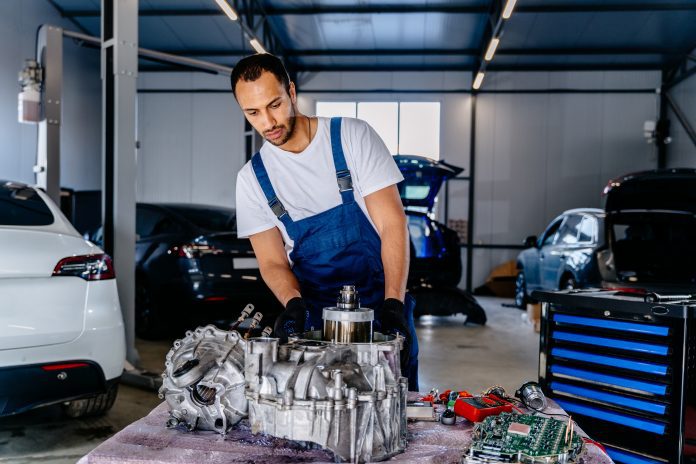Projections are that EVs will account for 50% of new vehicle sales by 2030. With that, dealership fixed operations need to adapt to meet the unique service needs of EVs. Investments in specialized equipment, training technicians, and focusing on new revenue streams are required to stay competitive. By preparing for these changes, you’ll position your dealership for EV success.
The Shift in Service Needs for EVs
It’s well-known that EVs require different service procedures than ICE vehicles. With consumers shifting to EVs, your service department will soon focus on maintaining high-voltage batteries, electric drivetrains, and advanced software systems.
Although EVs may reduce the number of maintenance visits, they introduce more specialized work. Regular software updates, battery diagnostics, and monitoring systems specific to EVs will demand attention. This shift reduces your dealership’s revenue from ICE vehicle maintenance, pushing you to adopt new fixed ops strategies to remain profitable.
Investment in Specialized Equipment
To service EVs effectively, your service team will need specific tools and equipment that differ from those used for ICE vehicles. For instance, EV batteries often require specialized lifts, and technicians need high-voltage safety tools to handle electrical components. You’ll likely need advanced diagnostic tools to interface with EV software systems to troubleshoot issues or perform updates.
While upgrading your service department to handle EVs will be costly, acting now ensures you’ll be prepared as EV adoption grows. By expanding your infrastructure to include fully-equipped EV-compatible service bays, your dealership will be better positioned to serve the increasing number of EV customers by making these investments.
Technician Training and Certification
To keep up with the rapid evolution of the EV landscape, you’ll need to train your technicians to work on high-voltage systems and other electrical components. This shift requires new skills compared to working on ICE vehicles, meaning your existing technicians may need to upskill or earn new certifications. Organizations like ASE offer certification programs specific to EV maintenance, providing technicians with expertise in electric powertrains, battery systems, and electrical diagnostics.
Training your current staff is a cost-effective way to address the skills gap. However, hiring new techs already trained in EV service could be a clever strategy as the demand for those with these specialized skills grows. And, by offering comprehensive training to your existing techs, you can ensure your dealership remains competitive as EV service needs expand.
New Revenue Opportunities from EV Services
Although EVs reduce the frequency of some maintenance tasks, these vehicles create new revenue opportunities. For example, software updates, battery health monitoring, and diagnostics are essential services for EVs, and you can offer them as regular maintenance items. Additionally, tire and brake replacement will remain critical, as these components wear similarly to those in ICE vehicles.
More new EV buyers are likely to return to your dealership’s service department rather than independent shops, as they trust that your factory-trained technicians will best perform EV maintenance.
Your dealership can also offer specialized maintenance plans and extended warranties tailored to EV owners. These plans could cover software upgrades, battery health checks, and other EV-specific services. By adapting your service offerings to meet the needs of EV owners, you can open up new revenue streams and further improve customer loyalty.
Conclusion
You can keep your dealership ahead of the EV curve by investing in specialized equipment, training technicians, and exploring new revenue opportunities. Taking action now to prepare for the growing EV market will ensure your dealership thrives in the long term and builds a reputation for expertise in this rapidly evolving industry.



